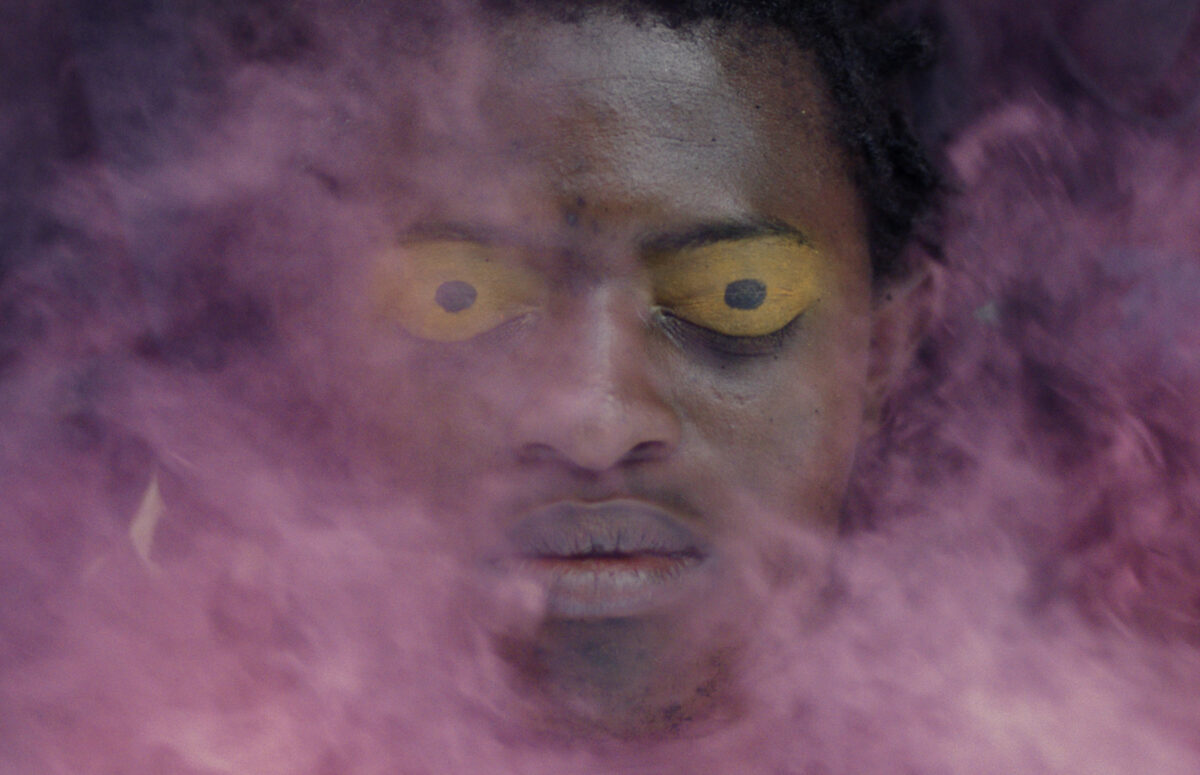One consequence of the globalisation that delivers festival audiences cinema from every corner of the planet is the homogenisation, even pasteurisation, of so-called ‘global cinema’. Already in the 70s Cahiers du cinéma was lamenting the rise of ‘Esperanto’ film, a one-size-fits-all style that generalises experience and lubricates cultural differences, allowing the filmgoer to feel up to speed with the basic goings-on in any given country by the time the lights come up.
Augure is the first film by the mononymous Belgian-Congolese director Baloji, and will be most of its audience’s first exposure to the cinema of the Democratic Republic of the Congo, a nation whose capital (population 17 million) recently went a decade without a single movie theatre. It begins with a prologue in which a horse gallops through the desert, carrying a black-clad woman past a set of scarecrows planted in the sand. She dismounts, crouching at an oasis, and begins to lactate into the water. Immediately, Baloji is suggesting a language of symbol and portent resistant to universal translation. But the narrative, once it kicks into gear, appears to go in a different direction, more palatable and less promising.
Koffi (Marc Zinga), a Congolese immigrant living in Belgium, is returning to his home country for the first time in eighteen years to introduce his family to his pregnant, white fiancée Alice (Lucie Debay). Arriving at the family house, the couple are greeted with coldness and bemusement, especially by Koffi’s stone-faced mother, Mujila (Yves-Marina Gnahoua). Everything suggests the time-honoured theme of the return of the native, of the impossibility of going home again, focused through a protagonist sufficiently Europeanised to go over in every cinema from Lisbon to Tallinn.
Koffi is prone to nosebleeds, and his blood ends up dripping on a baby niece his younger sister has reluctantly let him hold. The family’s utter outrage at this betrays something other than ordinary disapproval of an absent son. As we will later learn, the port-wine stain with which Koffi was born led to his being branded a zabolo, one under the malign and potentially contagious influence of the devil. After the incident, he is subjected to a violent ritual of purification, his family chanting along while Alice watches in horror.
Here, we are implicitly in Alice’s position—confused and appalled as we witness the frightening customs of a people we do not understand. The frantic, panicked camera more or less deprives us of any other mode of viewership. Here is the dilemma facing any filmmaker depicting a culture foreign to the majority of their audience: either soften the subject until it is palatable (the Esperanto solution) or emphasize that foreignness and run the risk of exoticism. Trying to calm his fiancée, Koffi says, ‘It’s nothing, it’s just bullshit’. Later he tells her that his difficult familial situation is essentially no different from what goes on back in Europe. Alice doesn’t buy it, and the way the story has been told so far makes it difficult for the viewer to either.
And yet Baloji makes it apparent, gradually and then rather insistently, that this dynamic is no more than a waypoint on the route to his larger ideas. The film begins to expand, incorporating the story of Paco (Marcel Otete Kabeya), a self-styled ‘street kid’ who lives with a gang of teenagers who all wear pink dresses, under the apparent care of a woman who breastfeeds them. Paco’s existence cannot be contained by sober realism or sensationalist ethnography. He is a key player in corybantic parades whose celebrants are costumed somewhere between Alexander McQueen and New Orleans Mardi Gras; he talks in hushed tones of a rival gang led by an owl-human hybrid; in the film’s most anti-realist episode, the bereavement that has shaped his life is retold as a variation on Hansel and Gretel. We also spend several scenes with Koffi’s sister, Tshala (Eliane Umuhire), whose polyamorous relationship is almost as repugnant to her family as her brother’s dark mark. In its second half, the style the film had established—those handheld, roving medium shots to which twenty-first century naturalist cinema defaults—is increasingly punctuated by tableaus in which contorted bodies take on a Géricaultian grandeur.
The last part of the film, set several months after what came before, centres on the aftermath of the death of Koffi and Tshala’s father, mysteriously absent throughout the film. As in every society, a death in the family means administrative business, ritualised mourning, spontaneous grief, whispered revelation of buried truths. But Baloji’s point is not to end his film with a glib exposition of what unites us all despite our many differences. It is no easier for the viewer to regain their footing in the picture’s last half hour than it is for the characters, deprived of their roles or attempting to inhabit new ones, no longer parsable as representatives or victims of some monolithic ‘culture’. Baloji operates a kind of visual and thematic crescendo, culminating in a fortissimo stab of crystalline para-realism a cut above everything that has preceded it. Here, the film speaks neither Esperanto, French nor Swahili, but a language of its own.
There is a waywardness about this film, as though Baloji’s material has pulled him in several directions at once. But those who refuse premasticated cinema cannot complain when a film is hard to swallow. Augure is no more pasteurised than the breast milk with which it begins, and to which it returns on several occasions, the image of a tenderness once felt and perhaps still glimpsed, diffusing through colder, darker waters.
